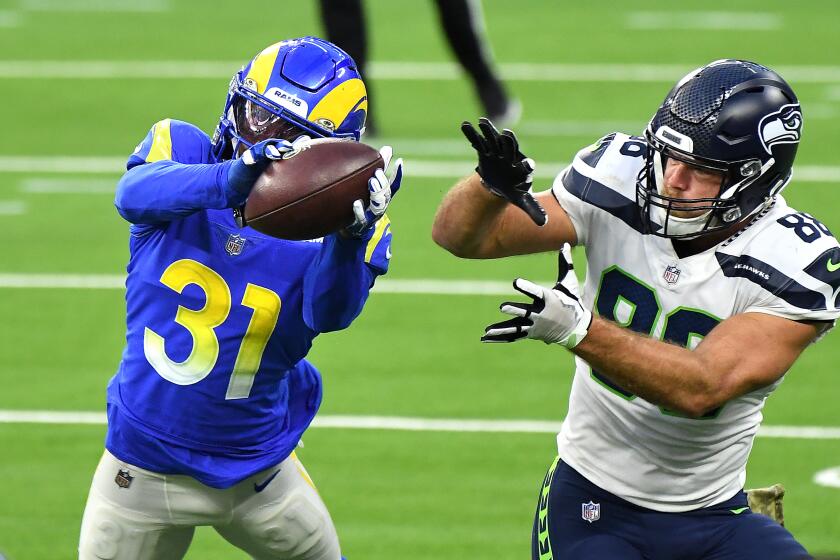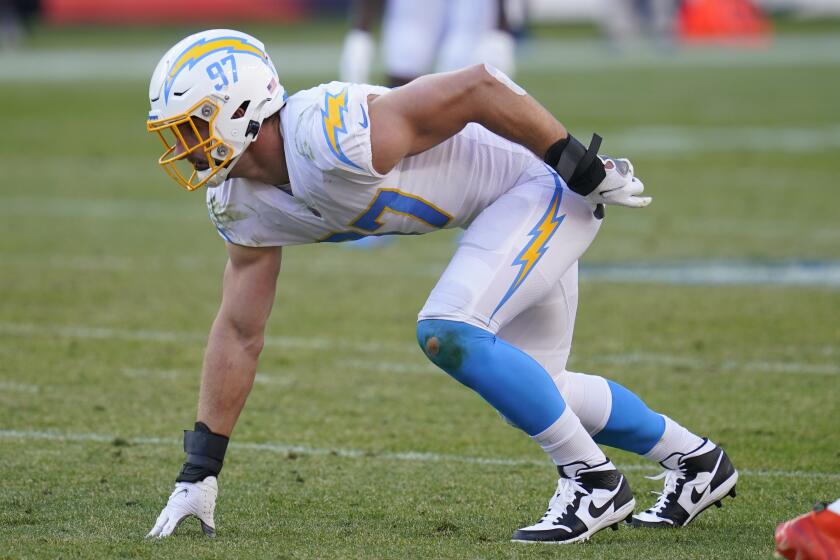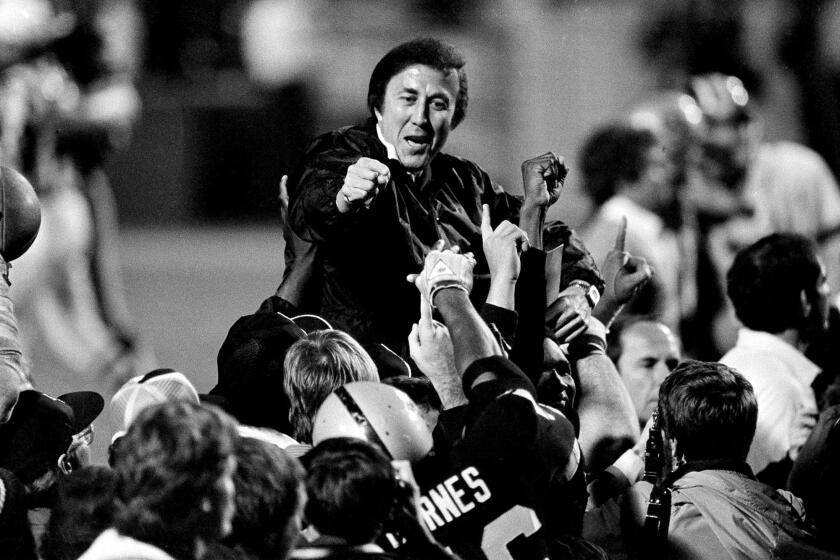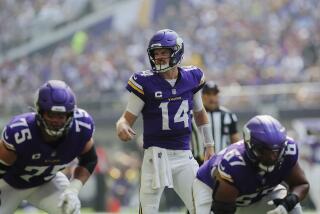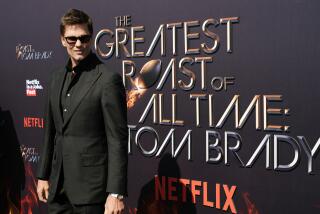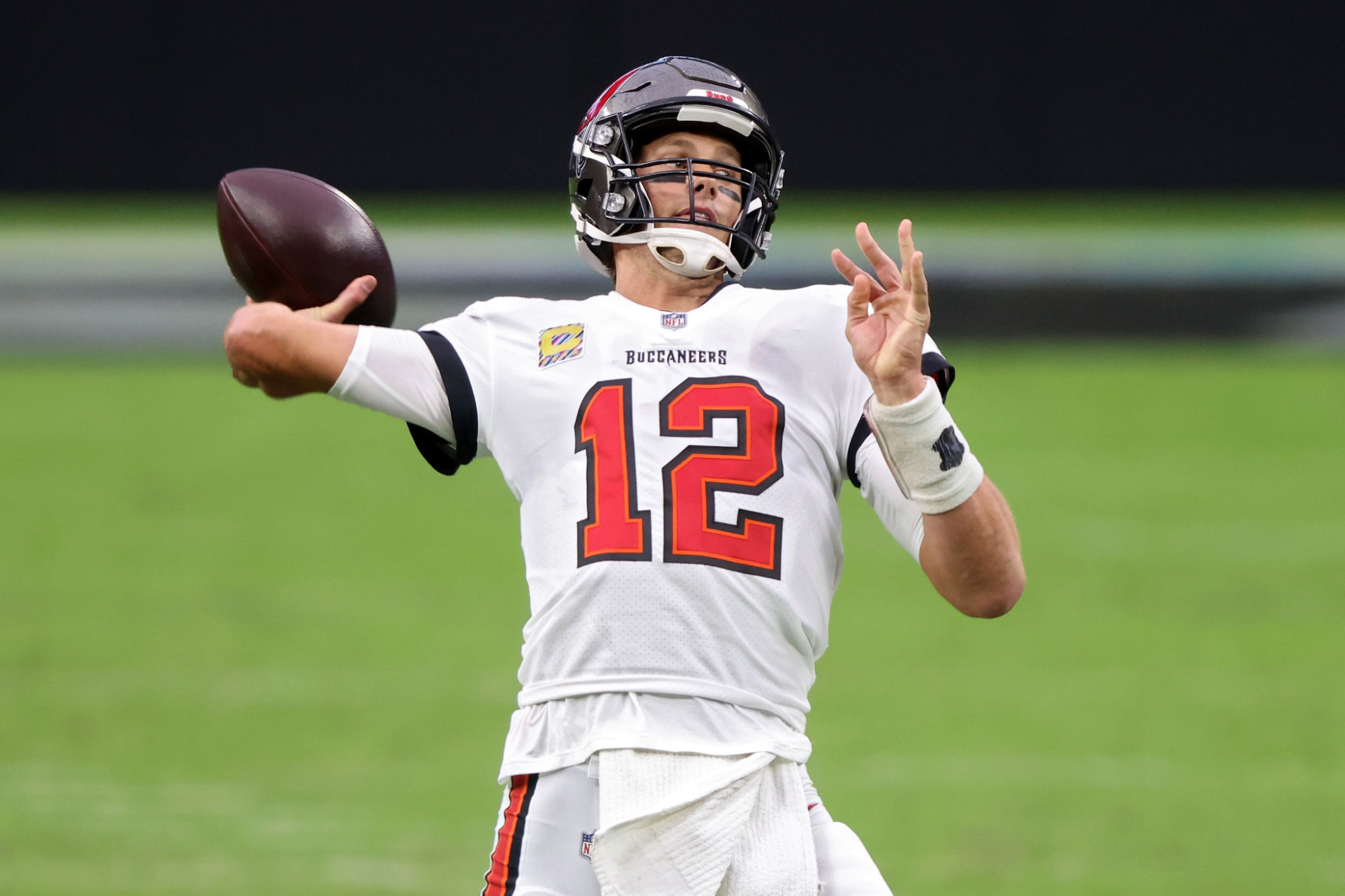
Trent Dilfer, Steve Young, Rich Gannon and Matt Hasselbeck break down what makes Tom Brady arguably the greatest quarterback in NFL history.
Tom Brady has a sixth sense to go with six Super Bowl rings.
The Tampa Bay Buccaneers quarterback, who faces the Rams on Monday night, is not only among the greatest players in NFL history but also has an uncanny ability to find receivers and deliver the football with surgical accuracy.
To understand just what sets Brady apart, four quarterbacks who reached the Super Bowl were surveyed — two of whom won — for their perspective on his game. Those quarterbacks are Matt Hasselbeck and Hall of Famer Steve Young, both ESPN analysts, Rich Gannon of CBS, and Trent Dilfer, who coaches high school football in Nashville.
They addressed the philosophies and skills that make Brady the player he is:
Trent Dilfer
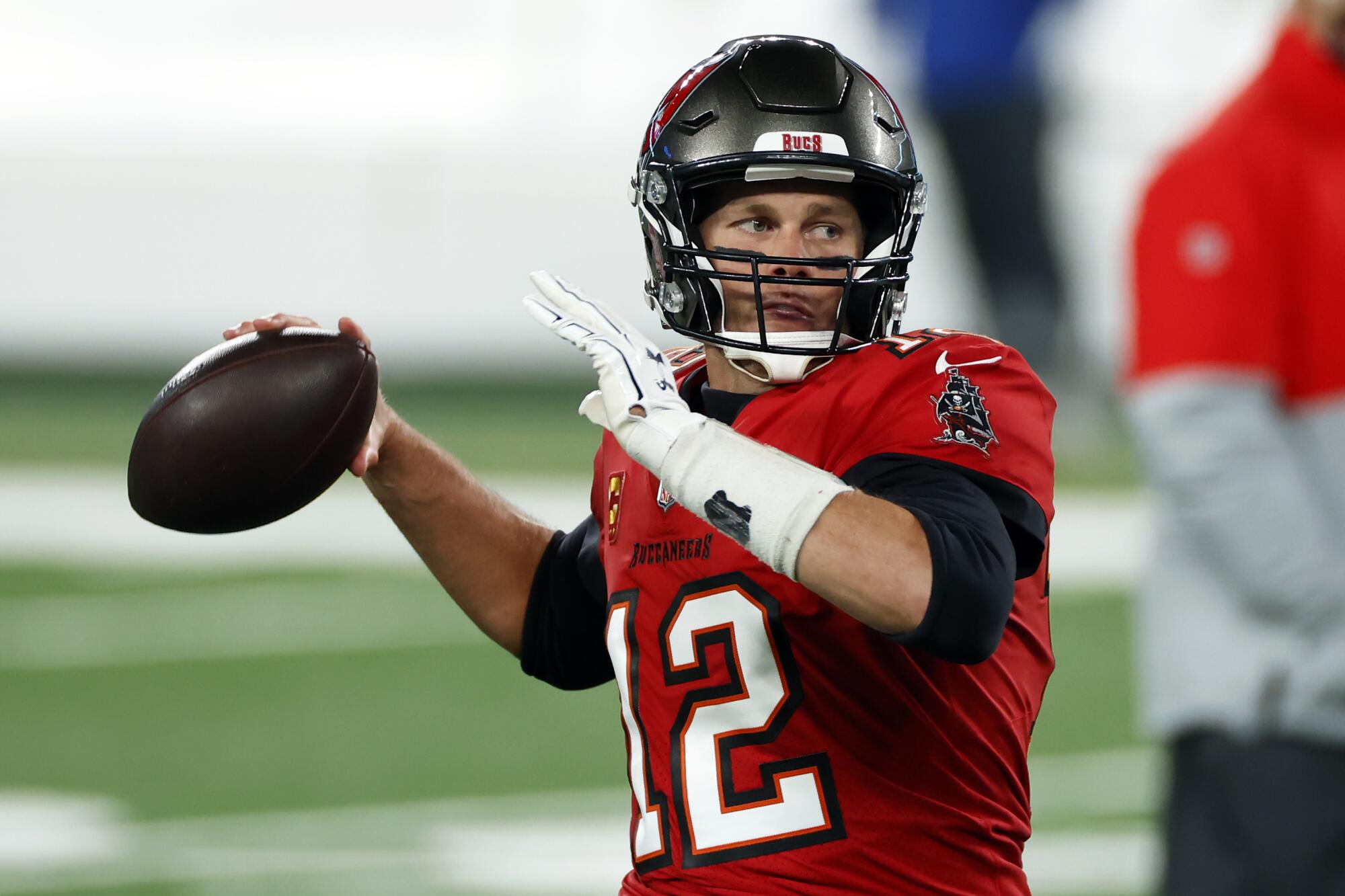
Tom Brady has lizard eyes.
What I mean by that is, he has true sideline-to-sideline eyes, almost as if his left eye can be watching the left boundary and his right eye is on the right boundary. Drew Brees can do that, so can Aaron Rodgers and Russell Wilson, Philip Rivers when he was at the top of his game, and Patrick Mahomes is getting there.
When I was playing, I don’t think I ever got past the numbers all the way to the sideline.
You absolutely can train that, and I think Tom’s just trained it over time. Say he’s under center, he’ll drop back and his helmet will be pointing forward. But then when you slow-motion it, he’s throwing a timing route for the left sideline. The only reason he knows the timing is he actually sees it over there. But his helmet’s dead down the middle.
To learn that, you’ve got to be willing to fail in practice, to push the boundaries. I talk to my quarterback on Tuesdays all the time, and say, “Hey, today’s the day to throw interceptions. I don’t want you to, but if you want to try something new and you force one, you can turn around and say, ‘Hey, listen, I was trying that.’ That’s a great answer. Because you were pushing the boundaries.”
“Tom Brady is walking grit. He sweats grit.”
— Trent Dilfer on what makes Tom Brady different
To me, the litmus test and one of the ways that really shows up for Brady is on third-and-eight. On that, the defense is playing some funky coverage. No matter how much you prepare during the week you don’t know what’s coming. In his third step, he sees what they’re doing and, boom, he hits the tight end replacing where the blitz was.
You’re like, “Holy crap! How did he see that?” When I was at ESPN watching tape during the week — and that’s why I’d get so passionate when I’d do these quarterback breakdowns on TV because I was blown away — I was like, if you understood what I watched on Tuesday afternoon studying Brady, your jaw would drop too.
We talk a ton in quarterback development about, you cannot guess. Even if you’re getting away with it, it’s essentially going to come back and bite you. Brady never guesses. He’s going to see it and process it, but he’s not going to guess. He probably has the demons of guessing early in his career, and at some point he’s like, “I ain’t doing that anymore.”
The other thing with Brady is his exactness. He’s exact with how a play is executed and where he locates the ball. So if he throws it low, there’s a reason why it’s low. He just doesn’t miss his target very often. That’s why he doesn’t throw many interceptions over the course of his career. Because even if he forces it, he’s forcing it into a safe spot.
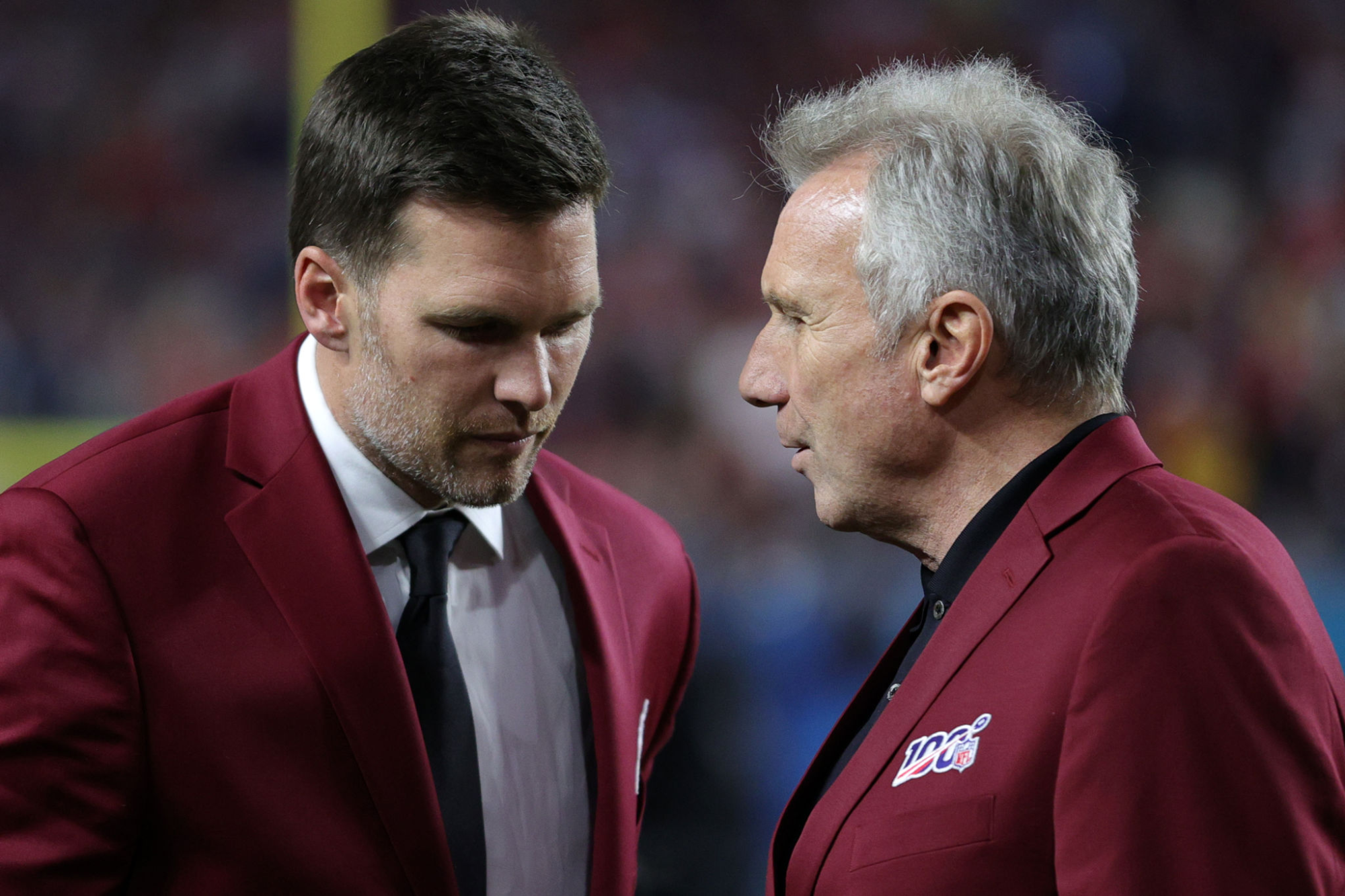
Joe Montana was very similar. People forget about Joe, and they can’t forget about Joe. He would throw more low-and-away, out-breaking cuts than anybody if it was a cluttered picture. When he threw it inside, it was below the numbers so his tight end wouldn’t get killed. It was always exact with where he located it.
That’s why I use pitching analogies with Brady and Montana and Brees so often. Because a pitcher, he’s aiming two inches outside the black on an 0-2 count for a reason. He wants a weak ground ball, or he wants a swing and a miss. He’s not going to throw a strike. Brady is very similar there.
There’s this trigger term that everybody’s using these days that Angela Duckworth really studied and coined: Grit. It’s a defined passion and perseverance towards a long-term goal. I think it’s his grit. A lot of people talk about it. Every football coach, including myself, tries to explain it, tries to get their team and coaches to buy into it. Tom Brady is walking grit. He sweats grit.
It’s his relentless — and I mean relentless — pursuit of greatness. And you can’t help but either join him or get the hell out of there. That’s coaches, players, trainers, equipment managers, you name it. You have no choice but to jump on the grit bandwagon, the relentless pursuit of greatness bandwagon, the passion bandwagon, the perseverance bandwagon, and just go. Because he’s not going to give you another choice.
Steve Young
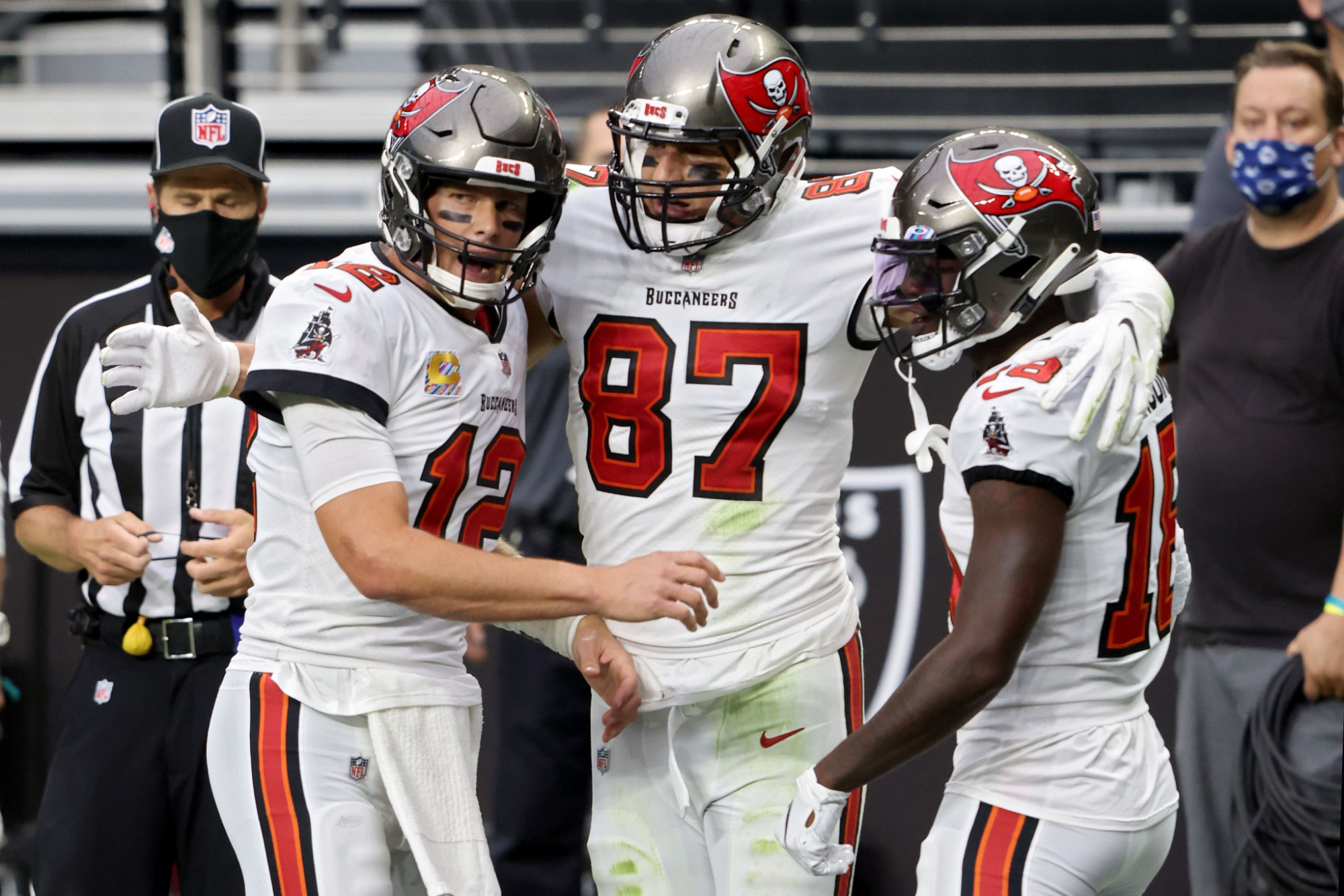
I’m amazed at the willingness Tom has — and really his family must have — for a myopic focus on football. People who are closer friends than me say that, for him, every hour is accounted for in April and May. Everything is about being able to play great football. What you eat, how you study.
I memorized every game plan when I played and thought I had every piece of data. But I think Peyton and Tom took it further. They expanded on every ounce of data, like, “What more can I learn? What more can I do?”
Every guy in the NFL was the best in their town, the best in their county, the best in college. They’ve been great for a long time, and now they want to be as great as they’ve always been their whole life.
They want to work, too. But now the professional game’s become more college-like, there’s not as much sophistication. And there’s a lot of players that are like, “No, I want more.” And Tom comes to town and is like, “You want more? I’ll give you more.”
That’s why he can come to Tampa, a team that’s used to a guy going in and playing ball and throwing it around, and he can say, “No, no, no, you guys don’t understand. The job is 10 times that.” And everybody gets energized around him.
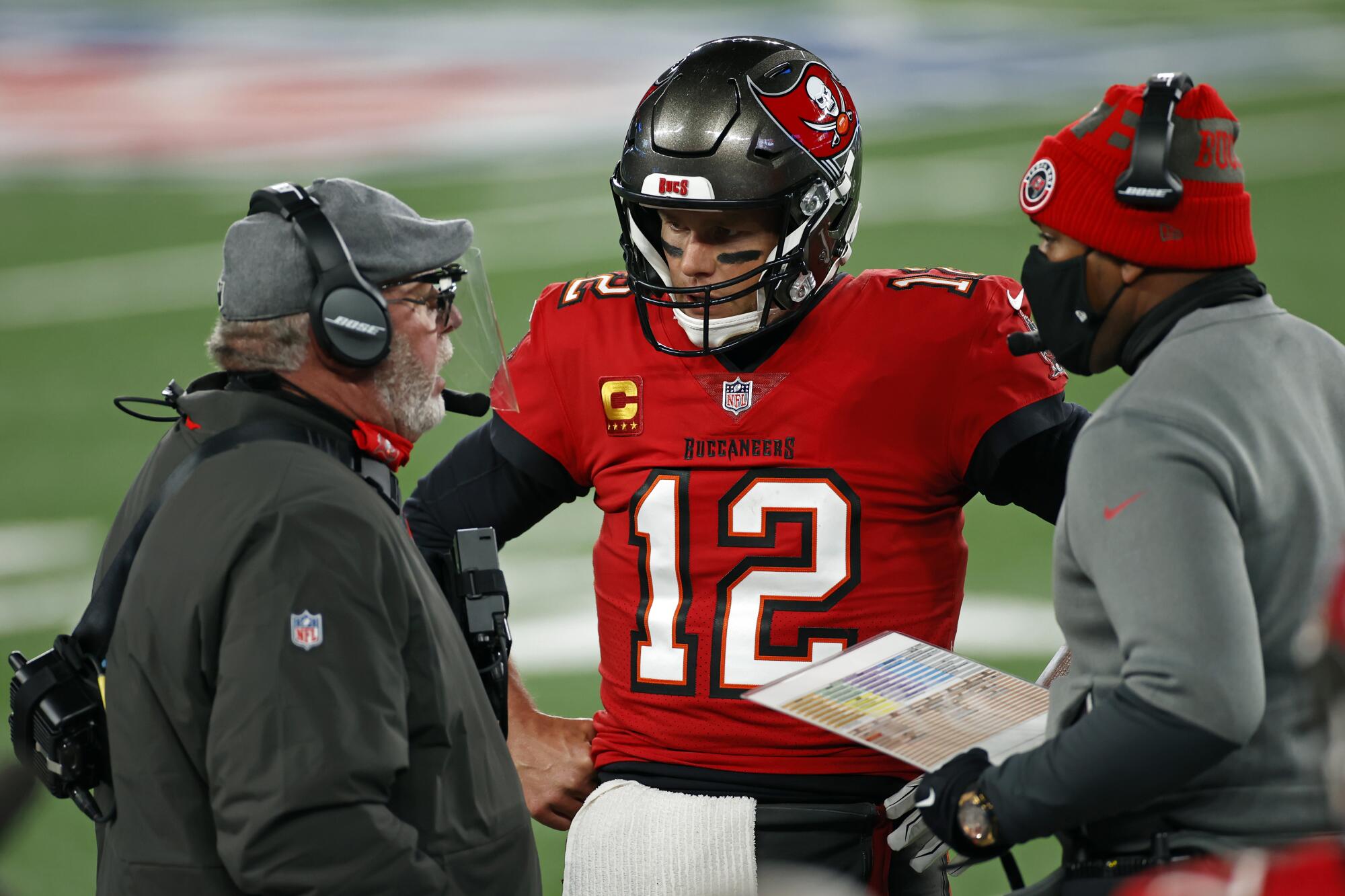
“The truth is, Tom is accountable. And he wants you to know that, so that you will be accountable too. It’s human nature.”
— Steve Young on how Tom Brady approaches the game
I love that Buccaneers coach Bruce Arians — obviously he and Tom have chatted about, “OK, if you don’t play good, I’m going to call you out.” And Tom’s like, “Yeah, do that. Make sure that I’ve got to come down here and be accountable.” And that’s what they’ve done. To have Bruce Arians in postgame go, “Mike Evans was open. He didn’t get him the ball. Evans was open a number of times.” Laid it right on Tom. And I think that Tom knew. Tom’s encouraging that. “Let them know that if I don’t play well, I didn’t play well.”
It’s not concocted. It’s because that Tom understands that at my age, my wealth, my wife, and my history and my success, to come to Tampa and gather people around me to actually go fight with me, is to give them that sense of truth that I am accountable.
I will stand with you, and no matter what, you know that I will be here, and I’m not going to duck anything. If I don’t play well, the coach is going to tell you. It’s not to fake anybody out, it’s to tell them the truth.
The truth is, Tom is accountable. And he wants you to know that, so that you will be accountable too. It’s human nature.
I always talk about mitigation. Every young quarterback wants to talk about the mitigating factors: the guy didn’t turn, no one blocked, the sun was in my eyes. It’s the truth. But it’s not accountability. Young players after a game will go to the press after a loss and you can hear it.
Playing opposite lockdown cornerback Jalen Ramsey, the Rams’ Darious Williams has intercepted four passes, including two Sunday in a win over Seattle.
You know what his teammates are saying? “That jerk’s not even taking the heat. He’s the one who threw the ball. He’s the guy who touched it every down.”
I guarantee when you talk to Tom’s teammates, there’s no undercurrent of jealousy. That’s what amazes me. There’s no, “Forget him. Who does he think he is?” Because he does the work. He tills the ground every day. Never takes a day off. The relentlessness, the focus on what really matters — memorizing the data, making sure everyone on the team is up to speed on all the data, letting them know that you’re accountable no matter what.
I learned it at about my 50th interception. I kept talking about mitigation, and finally I was like, “These guys aren’t responding.” I guess I can say that about Tom, is because I learned that and I know how important that is. I never spoke to a media person without an idea of gathering my teammates. That’s all I was speaking to.
A lot of people think Tom is a robot. But every statement he makes in the press is directed at his teammates. How to gather them. How to be accountable. How to make himself feel more relatable. I don’t think he’s ever said anything in the press that he really cared about getting out to anyone else but his own offensive linemen. Ever.
Rich Gannon
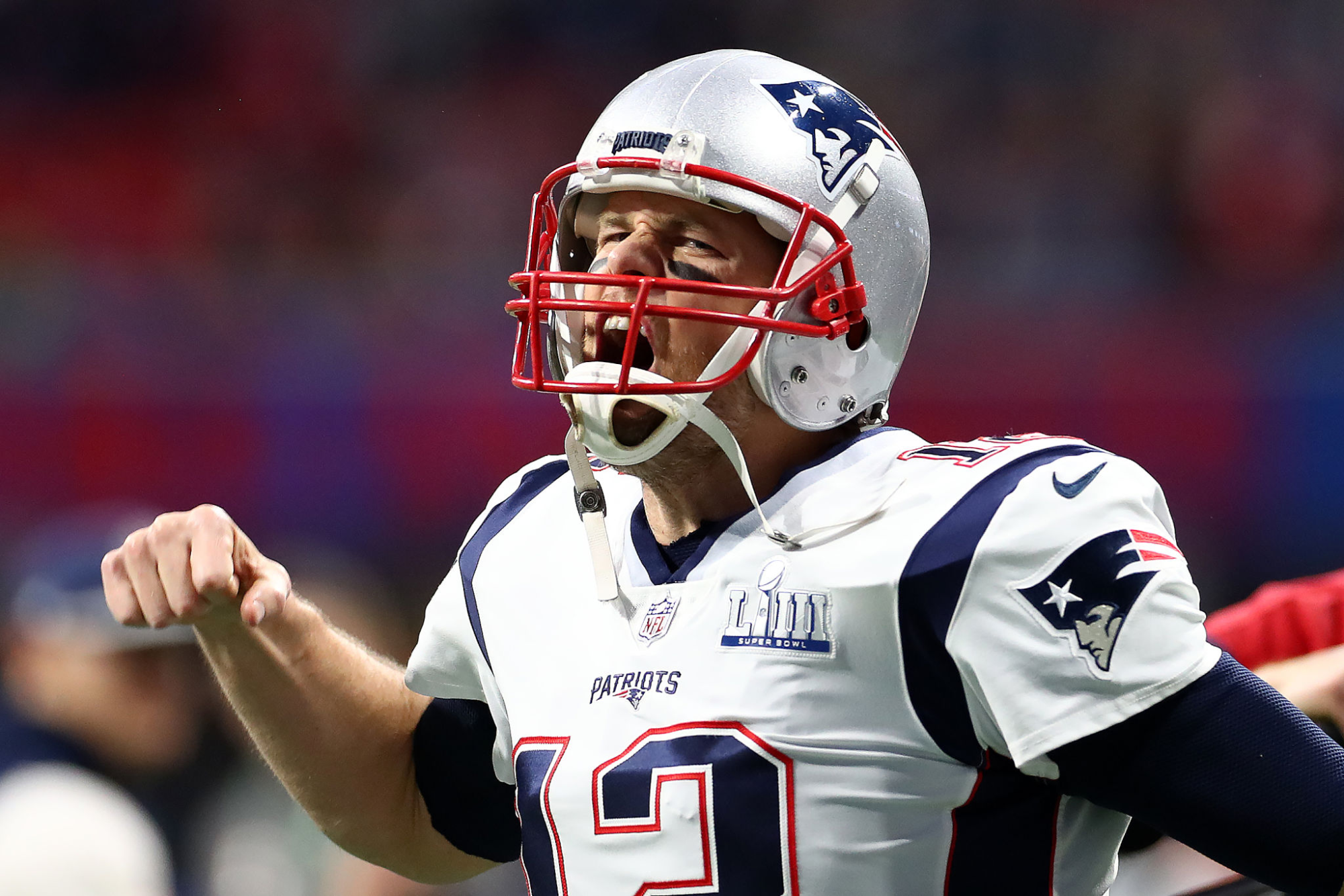
The thing about Tom Brady that has surprised me more than anything is how seamlessly he’s gone from one team to another, especially at this point in his career. People don’t understand how difficult that is. He and Josh McDaniels, New England’s offensive coordinator, could finish each other’s sentences.
They had a history together. When you have a history in a system, when problems arise, you know how to quickly fix them. Because it’s, “Oh yeah, we had that problem two years ago against the Jets.” But when you don’t have that history together, and you don’t have that same kind of background in communication and dialog and experiences, it’s really hard.
Going to Tampa Bay was a dramatic change. Different play caller. Different verbiage, terminology, system, players, culture, environment, discipline.
To me, the hardest thing going from Kansas City to Oakland was the lack of discipline and structure. It drove me crazy. Every day I walked out to practice, guys were late, guys didn’t care. I never dealt with that in Kansas City. I was like what is this?
That can be mind-boggling to a guy who’s set in his ways and used to it being done a certain way. He’s not going to rely on a position coach to make a correction. If it’s done right away, then fine. But if there’s a slight delay and it’s not corrected, then he’s going to make that correction. He’s the air-traffic controller, and he’s not going to let the plane crash. He wants it done a certain way, and if it’s not, he’s going to step in.
The hardest thing for me late in my career was being able to control my emotions and my temper. My patience with players who didn’t do it the way I expected them to do it.
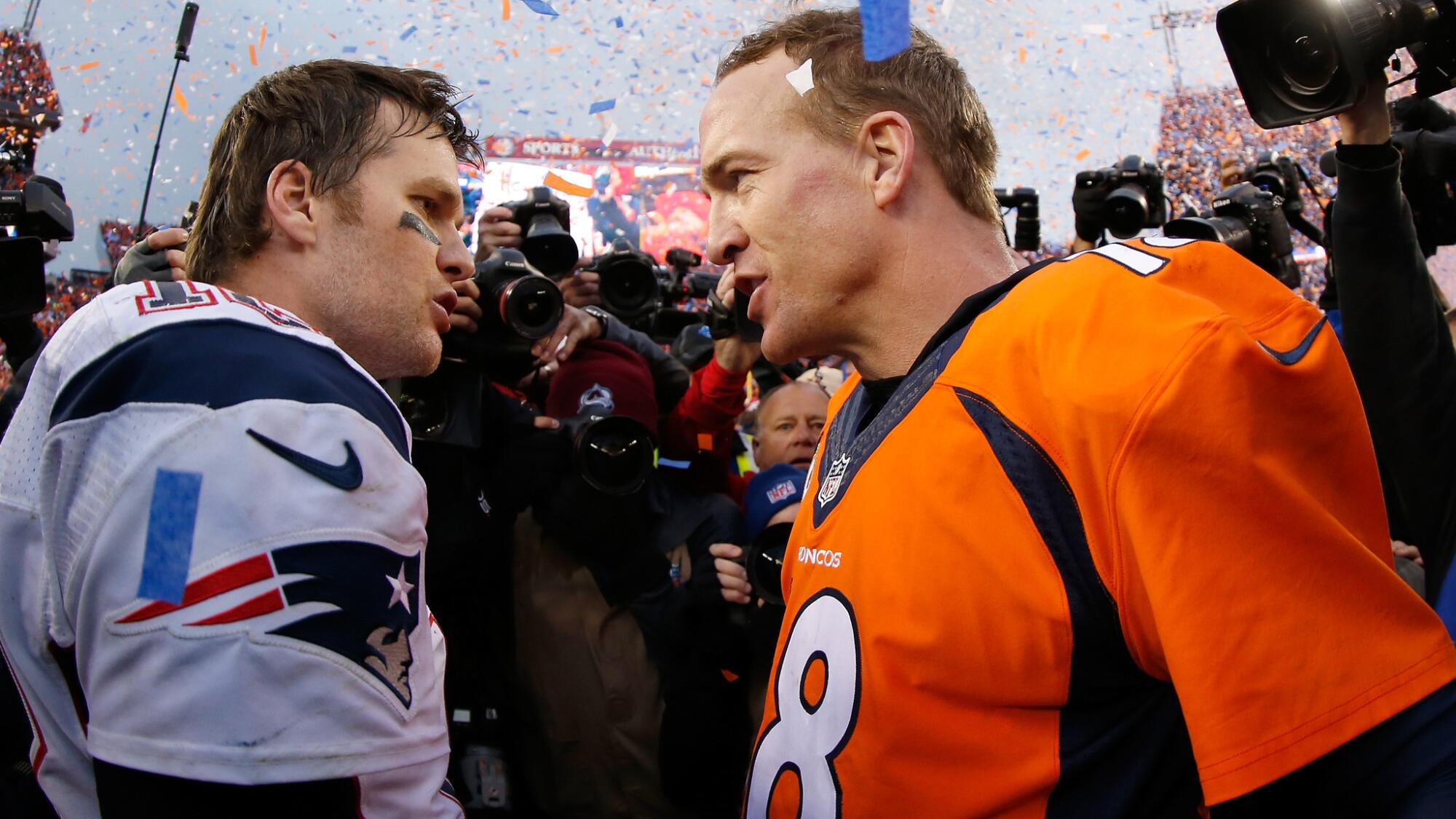
What Tom is doing in Tampa reminds me of what Peyton Manning did in Denver.
— Rich Gannon on Tom Brady
You have to be a jerk sometimes. But you have to know each personality. When it was Jerry Rice, you’re like, “Hey, Jerry, on that I expect you like to be two yards inside the numbers.” If it’s a young guy like Jerry Porter it’s like, “Hey, dude! Get your a-- there!” You’ve got to be careful. You’ve got to know the personalities.
If you don’t fix things right away, the guy who started running a route at 16 yards is suddenly running it at 14 yards. No one says anything for two days, and now the route’s at 12 yards. You’re like, “What the hell’s going on?” If you don’t fix it, correct it, coach it, all of a sudden you’ve got a pile of garbage.
What Tom is doing in Tampa reminds me of what Peyton Manning did in Denver.
When Peyton walked in the building, all of a sudden every guy in that building — I’m talking about if you’re the janitor, the equipment guy, the trainer taping ankles — every guy says, “Oh, my gosh. With this guy, we’ve got a chance to win the whole damn thing.”
Chargers’ Joey Bosa talks about his two weeks in concussion protocol. He has no recollection of the play that knocked him out of a game on Nov. 1.
Not only that, but everybody’s on high alert. Everybody is like, “Don’t let this guy down. This guy will call you out in the meetings.” It even happens with coaches. If you’re an assistant coach, you’re like, “I’d better have an answer, because if this guy asks me a question and I don’t know the answer, I might lose my job.”
If you’re the offensive coordinator, you’re like, “Oh, my gosh, this guy asks some critical questions. I’d better stay two or three hours later and be watching tape, because I’d better have every answer when this guy comes in tomorrow morning. Because he’s going to have questions.”
It really heightens everybody’s alertness, professionalism, attention to detail, sense of urgency. Because, “This is Tom Brady. I can’t screw this up.”
Matt Hasselbeck
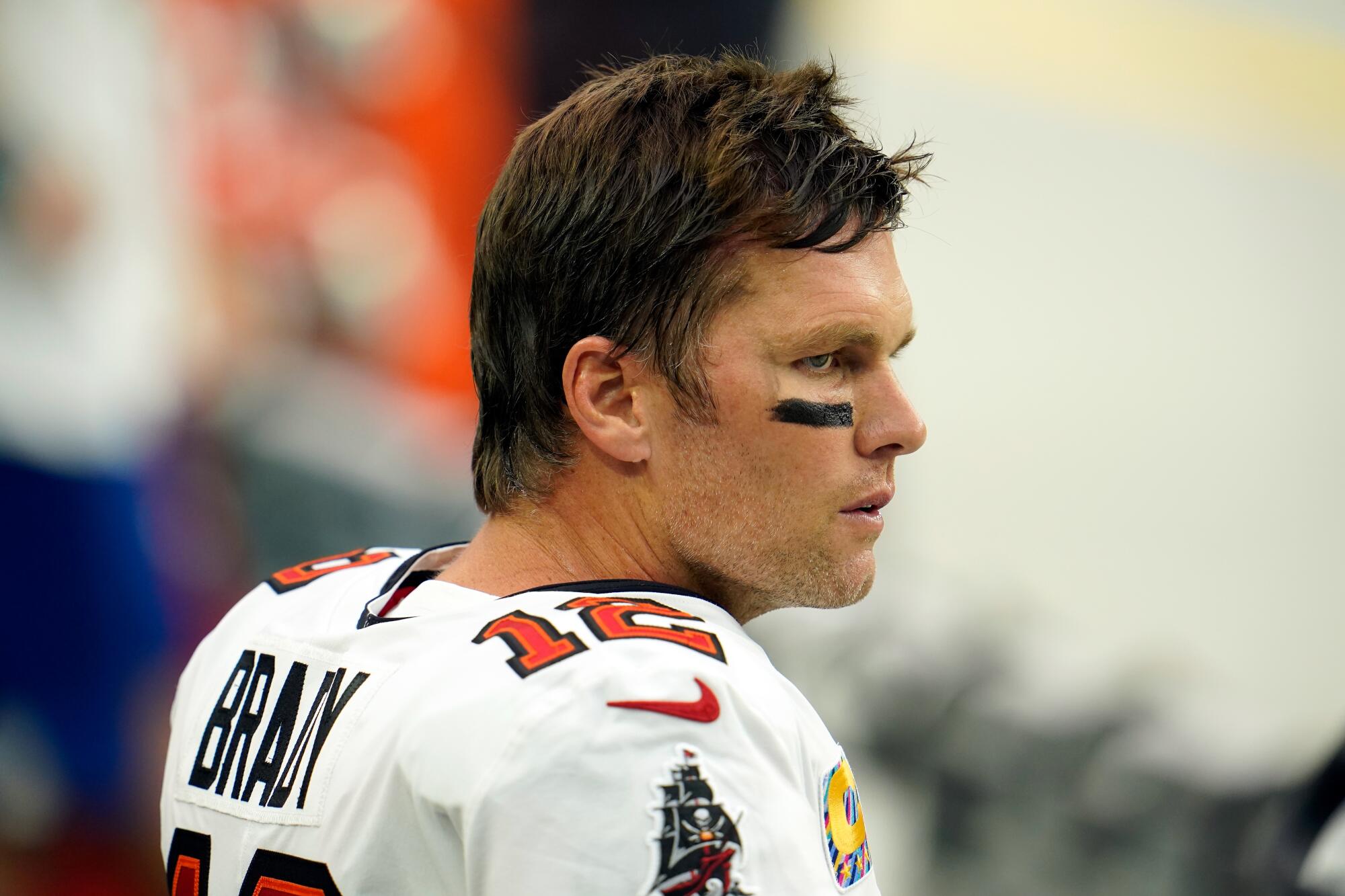
“One thing that separates Tom from everybody else is how hard he works. He’s maniacally obsessed with being great.”
— Matt Hasselbeck on Tom Brady
For Tom Brady, going from New England to Tampa has to rejuvenate him. It was that way for me when I left Seattle for Tennessee.
It was hard to go. My feelings were hurt. But when we went there was something so refreshing, so new, so different that it was almost exciting. It sounds silly but the change of scenery and the change of weather was such a huge difference. It almost made me feel eight years younger. All of a sudden instead of practicing on FieldTurf all the time, in a bubble because of bad weather, or practicing in bad weather, we all of a sudden are practicing outside on beautiful golf-course grass.
It was hot and humid and guys were complaining, “Oh, my gosh, it’s so humid out here,” and I was like, “Wait a second, my old joints and bones feel amazing out here. It usually takes me 12 minutes to get loose, and I’m loose in two minutes.”
I remember just being with my family after practice or when I had free time. My kids were in travel soccer, or they’re playing flag football. They’re playing outside. On Instagram, I see Tom and his family on their off-time, and they’re jet skiing, at the beach, you get the most beautiful sunrise and sunset photos. It’s a very different vibe than Brookline, Mass.
It’s also refreshing to come in, learn a new system, teaching some of the nuggets that you’ve learned in your career. It was 13 years for me in that little window. Tom’s at like 20-something years — I say it that way because if you count all of his playoff games, he’s actually played a full season, maybe two seasons on playoff games.
One thing that separates Tom from everybody else is how hard he works. He’s maniacally obsessed with being great. I think, I know that we give some of these other quarterbacks who are over 35 years old, we kind of just give them a pass.
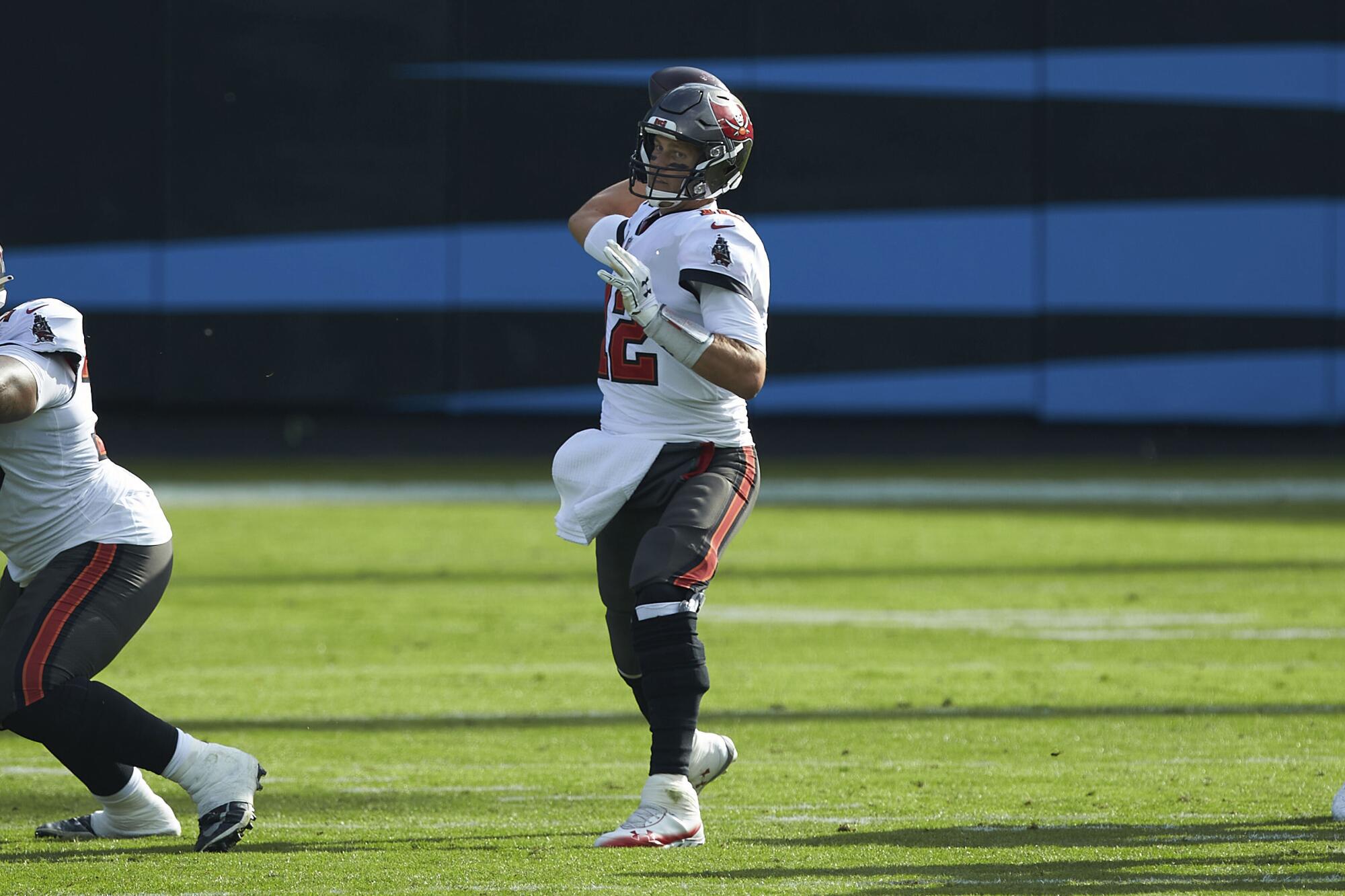
Brady’s doing it at 43. The older he’s getting the harder he’s working. I can remember as a 40-year-old quarterback, it’s really hard to be a great dad and be a great quarterback. Something has to give. Sacrifices have to be made.
I see him as somebody who is not cutting corners. I had the opportunity to watch some of the practice film, and I can’t believe how much Tom practices deep balls. He practices fade throws and deep balls more than 25-year-old quarterbacks. He’s out there at the beginning of practice and individual drills, when you’re kind of just warming your legs up more than anything.
Brady fires all the bullets in the gun every practice. He’s throwing a lot, to the point of, “Are you sure?” He’s working so hard when it would be very easy for him to take the veteran pass.
Knowing that coaching staff, they’ve obviously been around some great quarterbacks. Bruce, everyone knows, has coached Ben Roethlisberger, Peyton Manning, Carson Palmer, Andrew Luck.
And then the hidden member of that staff to me is Clyde Christensen. He was Peyton Manning’s go-to guy on all things football. And after Peyton it was Andrew Luck. I kind of knew of Clyde because he’s a legend in the coaching community. But then when I get to Indianapolis, he is the quarterbacks coach when I’m there with Andrew Luck for three years.
Former Raiders coach Tom Flores is the lone coach finalist for the 2021 NFL Hall of Fame class.
He’s special. You can see a little bit of why Peyton was the way he was. Again, Peyton, manically obsessed with doing things right. The whole building. Not just me, the whole building. I’m going to do them right in front of everybody.
For instance, Andrew had a flip phone. It’s not that he didn’t want to have a smartphone. It was, I’m not going to have a smartphone so that the rest of you all don’t be addicted to your smartphone.
It’s almost how I feel about Tom eating avocado ice cream. It’s like, “Hey, listen. My pleasure snack is avocado ice cream. So I’m not saying you all have to do it. But I just set a standard where you’re going to be like. ... I’m not going to eat avocado ice cream, but maybe I won’t go out booze bagging tonight with the boys.”
The best leaders are really smooth about that stuff. Tom’s not trying to push avocado ice cream on everyone else. He’s just kind of saying, “Hey, this is how I’m living my life. You see the success that I’ve had and I’m having.” You can’t ignore that.
More to Read
Go beyond the scoreboard
Get the latest on L.A.'s teams in the daily Sports Report newsletter.
You may occasionally receive promotional content from the Los Angeles Times.

